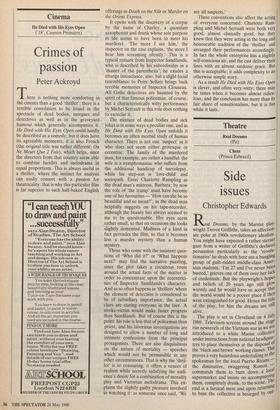Cinema
Crimes of passion
Peter Ackroyd
There is nothing more comforting in the cinema than a good `thriller'; there is a terrible consolation to be found in the spectacle of dead bodies, morgues and detectives as well as in the graveyard humour which generally accompanies it. He Died with His Eyes Open could hardly be described as a comedy, but it does have its agreeable moments; it is also French (the original title was rather different: On Ne Meurt Que 2 Fois), which helps, since the directors from that country seem able to combine lucidity and melodrama in equal proportions. This is always useful in a thriller, where the instinct for analysis can easily consort with a passion for theatricality: that is why this particular film is far superior to such half-baked English offerings as Death on the Nile or Murder on the Orient Express.
It opens with the discovery of a corpse by the name of Charley, a quondam saxophonist and drunk whose sole purpose in life seems to have been to meet his murderer. `The more I see him,' the inspector on the case explains, 'the more I hear him screaming silently.' This is a typical remark from Inspector Sandilands, who is described by his subordinates as a `master of the parenthesis'; he exudes a strange insouciance, also, but a slight facial resemblance to Peter Sellars brings back terrible memories of Inspector Clouseau. All Gallic detectives are haunted by the spirit of that famous policeman, of course, but a characteristically witty performance by Michel Serrault in this role does nothing to exorcise it.
The mixture of dead bodies and sick jokes is in some ways a peculiar one, and as He Died with His Eyes Open unfolds it becomes an often morbid study of human character. There is not one 'suspect' in it who does not seem either grotesque or eccentric. The family of the murdered man, for example, are rather a handful: the wife is a nymphomaniac who suffers from the additional handicap of narcolepsy, while his step-son is love-child' and sociopath. Enter Charlotte Rampling as the dead man's mistress, Barbara; by now the role of `the tramp' must have become one of her favourites — 'How can she be so beautiful and so mean?', as the dead man helpfully suggests on his tape-recorder, although the beauty has always seemed to me to be questionable. Her eyes seem rather small, so that on occasions she looks slightly demented. Madness of a kind in fact pervades the film, so that it becomes less a murder mystery than a human mystery.
Those who come with the insistent ques- tions of 'Who did it?' or 'What happens next?' may find the narrative puzzling, since the plot takes a circuitous route around the actual facts of the matter in order to concentrate upon the eccentrici- ties of Inspector Sandilands's character. And as so often happens in 'thrillers' where the element of detection is considered to be of subsidiary importance, the actual clues are staring everyone in the face. A stroke-victim would make faster progress than Sandilands. But of course this is the point: his role is less that of policeman than priest, and his laborious investigations are designed to allow a number of long and intimate confessions from the principal protagonists. There are also disquisitions on the nature of mortality — speeches which would not be permissible in any other circumstances. That is why the 'thril- ler' is so reassuring: it offers a veneer of realism while secretly satisfying the audi- ence's desire for a combination of morality play and Victorian melodrama. This ex- plains the slightly guilty pleasure involved in watching it: as someone once said, 'We are all suspects.'
These conventions also affect the acting of everyone concerned: Charlotte Ram- pling and Michel Serrault were both very good, almost clinically good, but they knew that they were acting in the long and honourable tradition of the 'thriller' and arranged their performances accordingly. In fact the whole enterprise has a slightly self-conscious air, and the cast deliver their lines with an almost sardonic graCe. But this is acceptable; it adds complexity to an otherwise simple story.
As a result He Died with His Eyes Open is clever, and often very witty; there may be times when it becomes almost ridicu- lous, and the conclusion has more than its fair share of sensationalism, but it is full while it lasts.














































 Previous page
Previous page